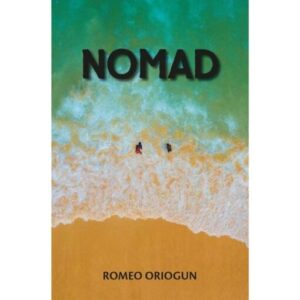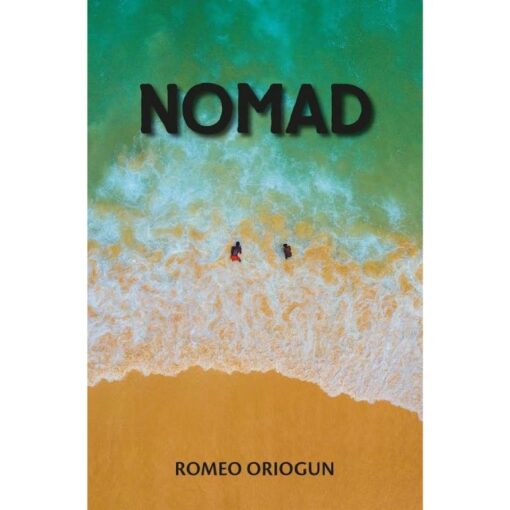By Samuel Osaze
Book title: NOMAD
Genre: Poetry
Author: Romeo Oriogun
Publisher: Griots Lounge Publishing Nigeria (2021)
Number of pages: 116
Reviewer: Samuel Osaze
I have always wondered what could happen on the day the real witness to man’s daily activities — the true historian, Nature — decides to bare it all. How much of man’s egregious falsehood and inadequacy would be revealed?
NOMAD, written by Romeo Oriogun, is rich in personification and other poetic devices. Such that, the Sahara Desert is ascribed human qualities of being conscious of activities within its confines. It says the desert is the true ‘historian’ of the people. I agree. At least, it keeps accurate records of those who come in contact with it. The desert sands “hold all that we need to speak from”, one of the poems further says.

Such outright comparison makes me wonder. Who else could tell in accurate terms, the stories of migrants who get sapped of every iota of strength before kissing the dust in the sweltering heat, save the Sahara Desert itself? The Mediterranean sea, on the other hand, knows for sure the number of those whose lives have been used as propitiation so other migrants could transit to the lands of their dreams. This postulation is not misplaced!
All these accentuate the preeminent theme in NOMAD. Migration. Apparently, this is summed up in the book title. Nomad is someone who is constantly on the move. Someone who lives a life of Itinerancy. Oxford dictionary (2022) has it that: “Nomad is ‘a member of a people that travels from place to place to find fresh pasture for its animals and has no permanent home.”
Over the years, while questing for better living conditions in other countries and even within the shores of motherland, Nigerians have become vagrants par excellence. As a result, they are susceptible to all forms of unspeakable exploitation, from Libya (popular for human trafficking camps) to the Maghreb region — home to the Taureg people, where the last lap to Europe is made. Oriogun’s travel poetry resonates with every displaced Nigerian. A horde of young Nigerians pass through the gauntlet, for example, from Benin City to Italy, mostly by road, maybe even as you read this.
The poem entitled ‘Someday the Desert will Sing’(91) lays it bare and argues further that the desert is the ultimate historian. It’s the preserver of bones, and of activities within its purviews. The desert is the leveler of both the herder and the herd, archivist of the people from time immemorial, the poem contends. It is written after Tade Ipadeola’s ‘Sahara Testament’ a collection of poems that won the Nigeria Prize for Literature in 2013. ‘Sahara Testament’ ‘explores the immensity and range of the Sahara Desert as a metonymy’. The first few lines of ‘Someday the Desert will Sing’ reads:
On the day of equinox, the camels walk slowly,
neither responding to the voice of their herders
or to the dunes slowly shifting through an endless arena
of sand. In the Sahara where water is an old tale
and the herders and the animals are one, united in life
as well as in an ongoing battle toward death,
there is a beginning in every grain of sand,
there is an origin in the night wind
and the caves with their many moments of history
hold all that we need to speak from…
Another poem in the collection ‘A Train Stop in the Sahara’ (pg93) portrays an astonished traveller, who is in awe of the desert’s vastness and emptiness. Its first stanza goes thus:
Who would have thought that man’s hunger
for movement would lead him here? Perhaps
the ancient ones knew, they saw the journey,
the endless desire for conquest; Alexander’s
sword coming down on history’s knot.
The last stanza of the poem sheds more light:
I, nomad, who walked through cities,
soundless like a bone thrown into a pit/
I have no language for belong…”
In treating the themes of migration and itinerancy, Oriogun adeptly paints picturesque scenes, however insane it is, of the harsh realities on embarking on a road trip to the Western world. There are many hurdles to cross on the way. The Sahara Desert and the Mediterranean Sea, each has become the eternal resting place for many. The peregrination is not novel. In fact, we all are witnesses to the part of Nigeria this ambition is endemic like a household plague.
The circumstances of Romeo Oriogun’s exit from Nigeria, circa 2016, were unpleasant. Consequently, one would expect the poet to divest himself of every vestige of such memory especially from a place brimming with xenomania. Oriogun could have reset his mind to realign with the new order. Or perhaps, enlist to forget about the past and squarely focus on the bright future—the banquet that providence has set before him at his new place of abode.
However, less than a decade of exile, in another clime where he is accommodated warts and all, Oriogun still seems obsessed with Nigeria, indeed, Africa. He remains an African poet, using his body of works to highlight the social context that prompted his exit. This is migrant literature whereby the writer involved, after departure from country of birth, advocates change in order for a better nation to evolve, on the experience of migration itself and what confronts them in the new place of residence, etc. These concerns are evident in the preeminent themes in NOMAD; the poet’s latest collection on the 3-man shortlist for the Nigeria Prize for Literature—NPL, 2022.
NOMAD is a mix-grill of themes. In part, it is the sum total of the poet’s experience in retrospect and the ways such social background intermingles with the new world. Of itinerancy, death, disillusionment of youths whose home is the greatest threat to their life purposes and finally, of the inevitability of culture-clash in a situation where two civilizations cross path.
The theme of migration resounds throughout NOMAD and is highly evident in poems like ‘The Birds are Moving to Timgad (pg88), Migrant at the Sahara(pg90), A Train Stop in the Sahara (pg93), ‘The Sea Dream of Us’ (pg95), ‘Migrant by the Atlantic Sea’ (pg96), ‘A Phone Call from Exile’ (98), to mention but a few.
Nonetheless, ‘Migrants at the Sahara’ takes the reader back to the beginning of the journey where intending sojourners are prepped for what lies ahead. In this case, the poet person, upon being intimated of the smell of death in the Sahara and other gory details on the way to Europe, reneges his dream of crossing the dreadful desert and its endless dunes. Just before then, albeit, the first poem in NOMAD titled ‘The Beginning’ (pg1) posits that when a man is displaced, it is not he alone that bears the burden of a fresh start.
The title poem NOMAD (p99) appears to be the climax of the entire transitory phases. In it, a ‘successful’ migrant speaks while possibly lounging somewhere cozy in Brooklyn, reflecting on his past. The first stanza of the poem is the effusion of a grateful heart. It says: “In Brooklyn, we drink to a toast/ in Samar’s asylum, wondering how to quiet/the countries speaking in our mouths.” The final destination is reached. Asylum is granted. With relative comfort achieved, the migrants can only look back in praise.
The poet person seems to have a fond memory of Benin City. In so many ways, the city’s lifestyle is palpable in a handful of poems. In relaying the theme of colonial invasion and identity theft, relics of colonial history are exhumed in the ancient city to convey this message. For instance, the poem— ‘Waiting for Rain’ (pg23) talks about the sculpted images of Edo warriors who succumbed to colonial gunpowder before the city’s treasury was pillaged in 1897.
Though not mentioned specifically in the poem dedicated to the Edo martyrs, one name stands out among these valiant men and women. He’s Asoro n’Iyokuo— a soldier of rare breed and military ingenuity, said to have led a group of soldiers in an ambush against the British invaders. His statue erected at Oba Ovonramwen square, Sakponba Road, Benin City, demonstrates how he routed many imperial soldiers before eventually giving up the ghost from mortal wounds.
I wish to reiterate that NOMAD embraces several themes. I can’t dwell on them severally in this review. Nevertheless, it’s important to highlight a poem that draws the reader’s attention to the poet’s handling of searing emotions at a time of grief. ‘The River is by the Door’ (pg54) narrates the horror of losing a mother and the persona’s involvement in the burial rites.
The collection of poems is dedicated to the poet’s mother– Dorcas Osadiaye. Oriogun’s loving memory of his mother reminds me of mine who shared a similar fate to his. Poets who’re brought up singlehandedly by mothers, I conclude — will continue to extol women as the bedrock of society. Without a doubt, a woman’s devotion to raising offspring is second to none!
A certain inclination is obvious among a crop of writers. It is the infusion of unrelated images into lines to make writing surreal. It is not my task to praise or denounce. However, plaudits abound for this trend among literary experts. I am yet minded to voice an opinion. It is that in the bid to experiment with style, whether of language or form, the poet must not compromise clarity. He must not deliberately obfuscate his craft as if encumbering the reader to decipher the jabber of a mad man. NOMAD reflects the consciousness of a poet that’s wholly committed to his craft; in the narration of history and challenges that beset a nation or humanity as a whole.
Oriogun’s poetry conjures images of both Christopher Okigbo and Gabriel Okara in the treatment of culture clash and devotion to the water goddess of wealth and fertility (Olokun), respectively. However, what perhaps distinguishes Oriogun from these ancestors is the dearth of musicality in his well-honed, and heavily loaded poetic arsenal. This, I reckon is what, adds more color to poetry in reading and recitation.
At some point in the course of reading NOMAD, I felt lost in a book chapter with the peculiar banality of prose sneering at me. Nonetheless, what Oriogun doesn’t have in rhythmic flow, he makes up for abundantly in his refreshing style, simple yet profound diction clad in rich literary devices. However oxymoronic that appears, I believe, it forms part of what makes Oriogun’s poetry garner the sort of acclaim it has today among critics, being generally referred to as a new and ‘defining voice in African poetry’.
There is no discountenancing the likelihood the poet may have written from a personal experience, given the circumstances of his exit from Nigeria. On the heels of a most barbaric act — the poet while on an official duty in Akure, had watched a mob lynch a fellow homosexual. Fearing such fate might befall him, Oriogun did not need a crystal gazer to prompt him into leaving the scene and city. Today, he writes from the United States of America. Nevertheless, this account could as well be brought to life by way of imagination or by sheer dint of rigorous enquiry. Whichever pool the writer’s muse has drawn from, the accounts are vividly painted. Thanks to the poet’s commitment to figures of speech and felicitous language.
- Osaze Is the author of The Strange Moon of Yenagoa (poetry). He writes from Lagos


